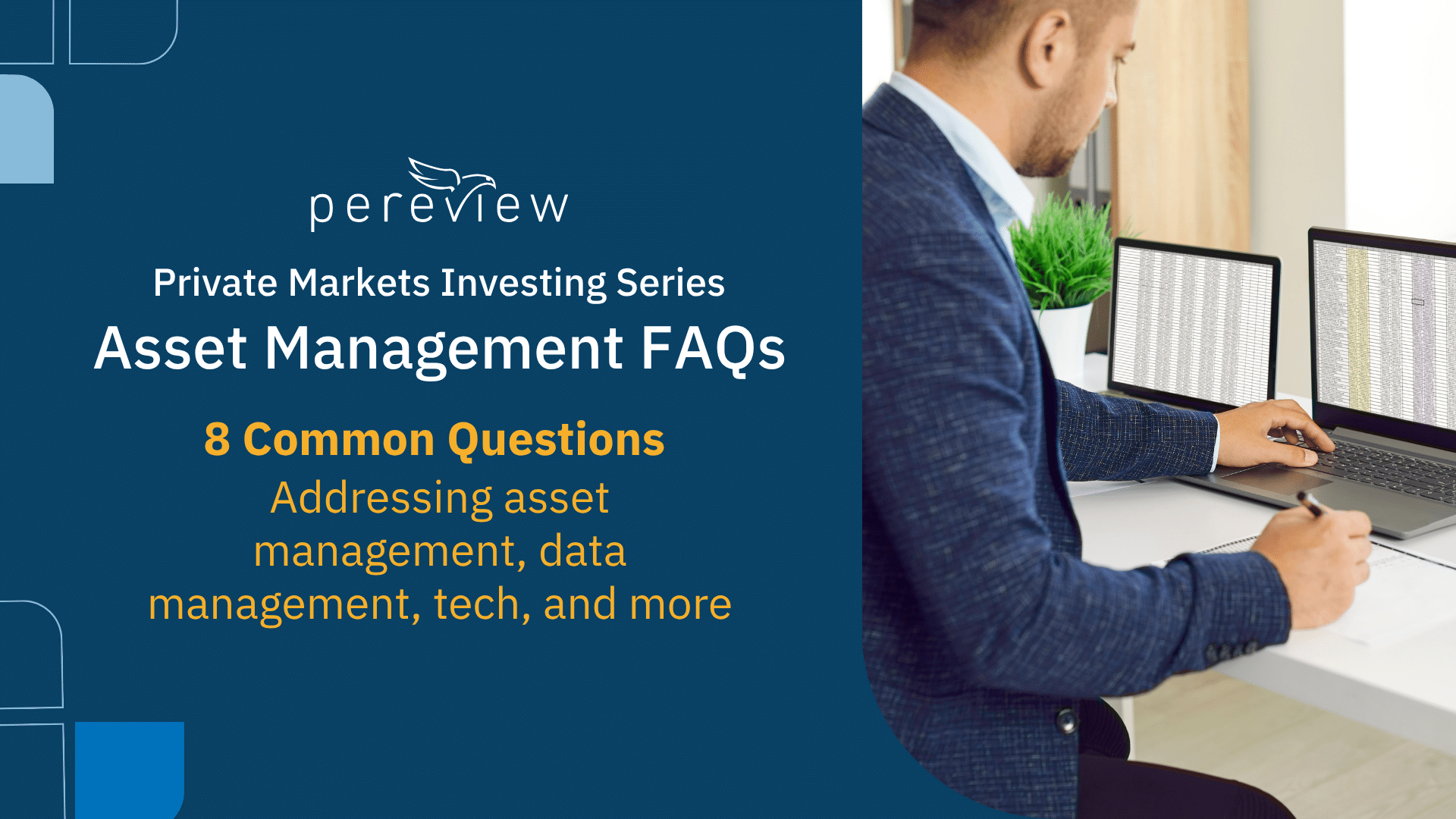Managing real estate investments has never been more complex – or more dependent on accurate, accessible, and real-time data. For asset managers, portfolio managers, and chief investment officers, the ability to oversee operations, report to investors, and manage risk hinges on having the right technology in place. This FAQ breaks down the most common questions surrounding real estate asset management software, focusing on how Pereview helps teams unify data, automate workflows, and drive better decision-making.
What is real estate asset management software?
Real estate asset management software is a digital platform that helps owners, operators, and investment managers oversee, analyze, and optimize their real estate portfolios. These solutions consolidate financial, operational, and market data in one centralized location to streamline decision-making and improve asset performance. Pereview provides advanced features such as automated reporting, data integration, and real-time analytics. These tools also reduce dependence on spreadsheets, standardize workflows, and increase cross-functional visibility between teams. Additionally, they enable collaboration between internal departments and third-party stakeholders, ensuring everyone is working with the same up-to-date information.
How does real estate investment management differ from asset management?
While real estate asset management focuses on the day-to-day performance and value of individual properties, real estate investment management takes a broader view of the overall portfolio. It involves decisions related to fund strategy, capital allocation, and investor relations. Investment managers rely heavily on real estate investment management software to automate financial consolidations, manage capital calls and distributions, and ensure compliance with investor and regulatory requirements. Together, asset and investment management systems form the operational backbone for high-performing real estate firms. Firms often build strategic models that blend the two disciplines – enabling them to focus on both tactical execution and long-term capital growth.
Why is real estate data management important?
Data integration is critical because real estate investment data often lives in disparate systems like accounting software, Excel files, market research tools, and property management systems. Real estate data management platforms unify this data, creating a single source of truth that improves accuracy, reduces manual work, and enables better forecasting. Pereview enables AI-driven automated data ingestion coupled with validation to support real estate data intelligence across the enterprise. Additionally, Pereview’s Excel model integration allows teams to continue to connect their established Excel models to Pereview and continue to use them without the manual data management challenges. Without proper integration, teams spend countless hours cleaning and aligning data rather than generating actionable insights. This slows down workflows, creates inconsistency in reporting, and increases the likelihood of errors that can impact critical investment decisions.
What are the benefits of using real estate portfolio management tools?
Portfolio management tools allow users to:
- Monitor performance at the asset and portfolio level
- Conduct scenario planning and what-if analysis
- Gain real-time visibility into financial and operational metrics
- Track KPIs across asset types and geographies
- Standardize reporting for investors and internal stakeholders
These tools are especially valuable when managing mixed portfolios that include equity and debt investments. With automation and real estate data pipelines, firms can shift from reactive reporting to proactive strategy. Portfolio managers can compare historical trends, benchmark asset performance, and quickly respond to changing market conditions. Additionally, these tools support strategic planning by helping firms identify underperforming assets, evaluate hold-sell scenarios, and assess opportunities to reinvest capital across the portfolio.
How does real estate asset management software improve investor reporting?
Investor reporting tools within real estate investment management platforms provide transparency and consistency. They automate data pulls, standardize templates, and reduce the time it takes to compile reports. This enables firms to:
- Deliver capital account statements quickly and accurately
- Schedule recurring reports for compliance and transparency
- Minimize risk of manual error or inconsistency across reporting cycles
Pereview includes features specifically designed to streamline investor communications and financial disclosures. These reports can also be customized by asset, region, or investor preference to meet evolving stakeholder demands. Many firms also use these tools to track investor engagement metrics, such as report open rates or dashboard logins, as part of a broader investor relations strategy.
What role does debt management play in real estate asset management?
Debt management in real estate is a crucial component of comprehensive real estate portfolio oversight. With integrated debt management tools, users can:
- Track loan terms, covenants, and amortization schedules
- Forecast debt service obligations
- Automate interest and principal payment calculations
- Monitor real-time debt exposure and compliance risk
Debt positions can have a material impact on cash flow and risk exposure. Pereview combines debt and equity data in a unified view across the capital stack to support better decision-making, covenant compliance, and funding analysis. This visibility is particularly useful when evaluating refinancing options, navigating rate volatility, or managing multiple loans across a diversified set of assets.
How do automated financial consolidations support real estate investment accounting?
Manual financial consolidation is time-consuming and error-prone. Real estate investment management software automates this process, reducing month-end and quarter-end close times. With built-in rules for intercompany eliminations, currency conversion, and audit trails, finance teams gain speed and accuracy. Automation also reduces dependence on ad hoc Excel models, improves audit readiness, and supports multi-entity roll-ups across the portfolio. Furthermore, firms can reduce their reliance on external consultants or temporary staff during reporting cycles, leading to long-term cost savings.
What is real estate data governance and why does it matter?
Real estate data governance refers to the policies, procedures, and technologies that ensure data accuracy, consistency, and security. In a sector where reporting accuracy is paramount, robust data governance is essential for:
- Regulatory compliance
- Investor trust
- Operational efficiency
- AI-readiness and predictive analytics
Pereview promotes governance through real estate data validation, standardized data models, and observability dashboards. Governance also ensures a scalable framework for onboarding new assets or teams, which becomes critical as firms grow or restructure their portfolios. Strong governance practices also support ESG and other initiatives by ensuring that sustainability-related metrics are auditable and reliable.
Can real estate asset management platforms help with compliance and risk management?
Yes. Real estate asset management software often includes built-in alerts, compliance checklists, and audit logs to help teams stay on top of regulatory and investor obligations. This includes:
- Automated covenant tracking
- Data submission portals for reporting
- Role-based access controls
- Full data lineage tracking
By flagging compliance gaps in real time, teams can avoid penalties, enhance transparency, and instill investor confidence. These tools also support internal risk reviews and audit workflows. In addition, many firms configure alerts for operational metrics such as occupancy dips or budget overruns to proactively identify potential problems before they escalate.
How do I choose the right real estate asset management platform?
When evaluating real estate investment management software, consider the following:
- Ability to support both equity and debt investments
- Depth of investor reporting tools
- Real estate data integration capabilities
- Support for data governance and observability
- Open API access and compatibility with your existing tech stack
- Ability to consolidate siloed data across the full investment lifecycle
Ultimately, the best platform is one that centralizes and standardizes your data, automates time-consuming tasks, and scales with your portfolio. Whether you’re focused on real estate investment accounting, performance optimization, or investor communication, a robust asset management solution like Pereview is the foundation for long-term success. As more firms adopt AI-powered insights and automation, choosing a future-ready solution is key to maintaining operational excellence and competitive advantage.



